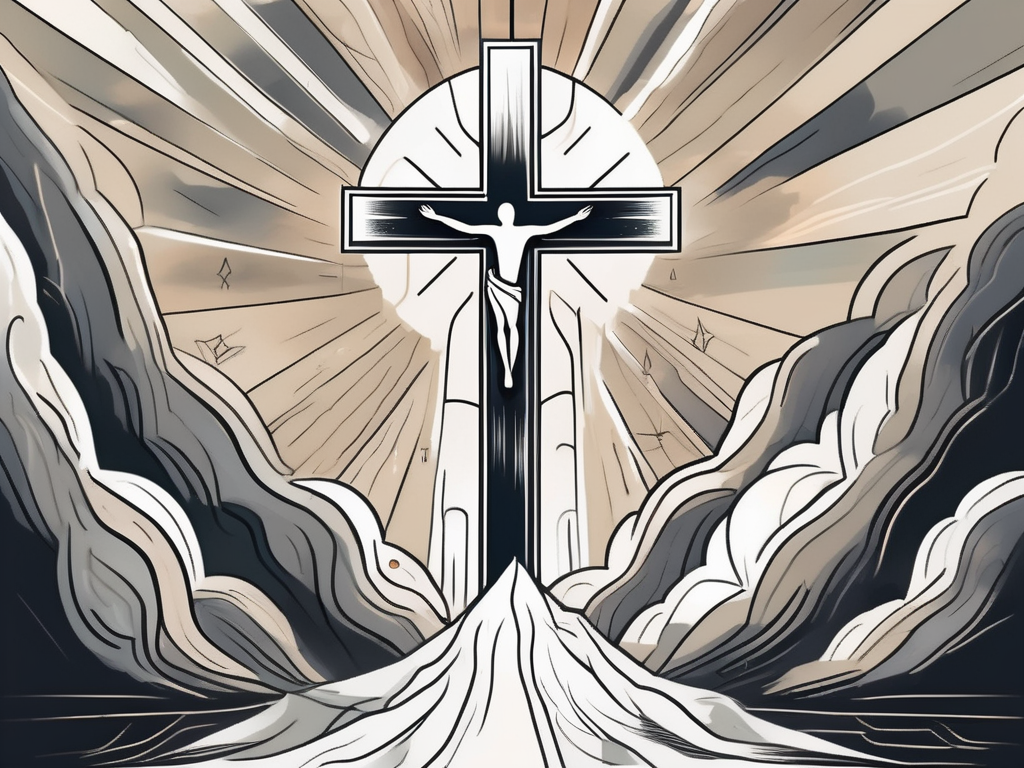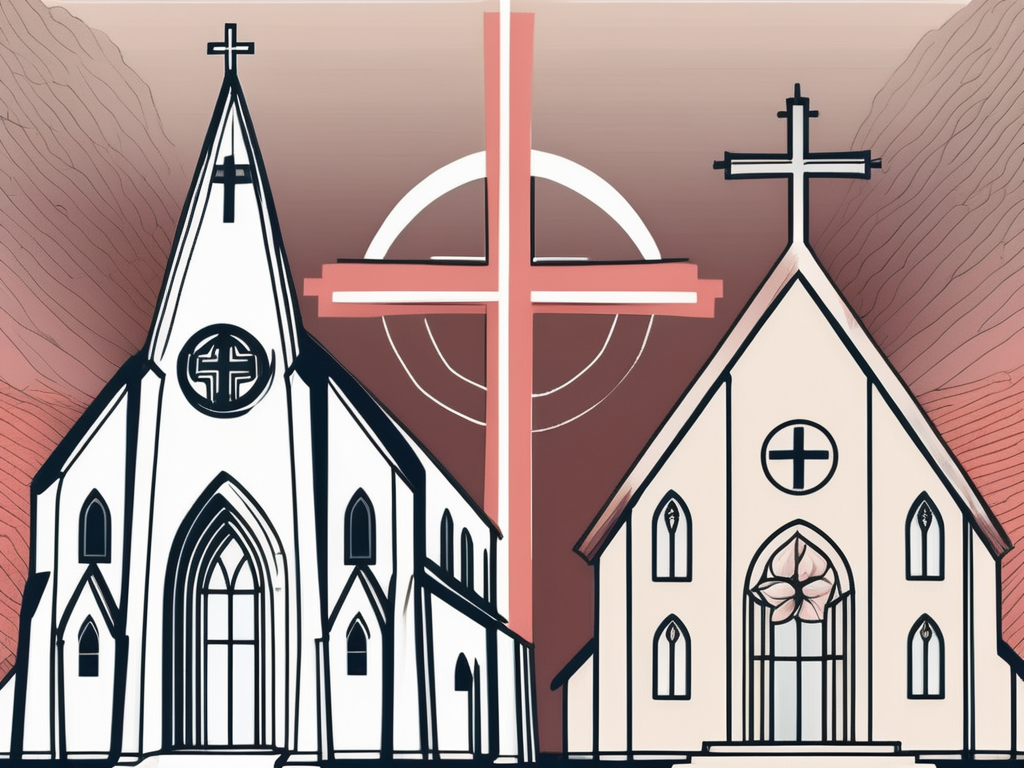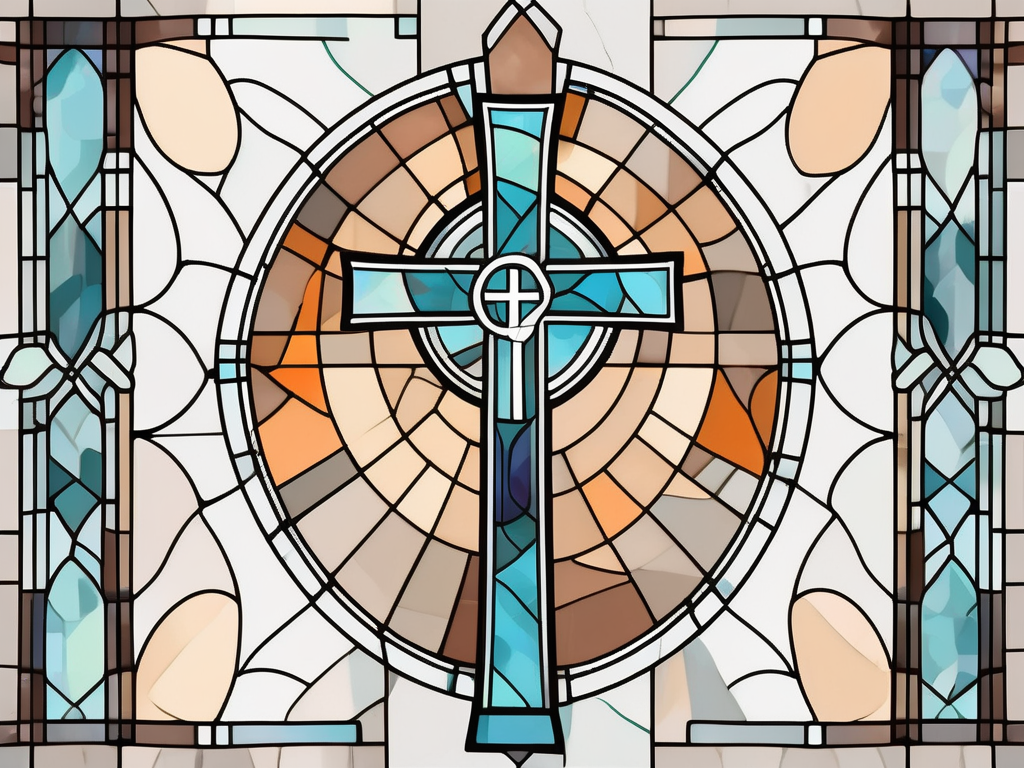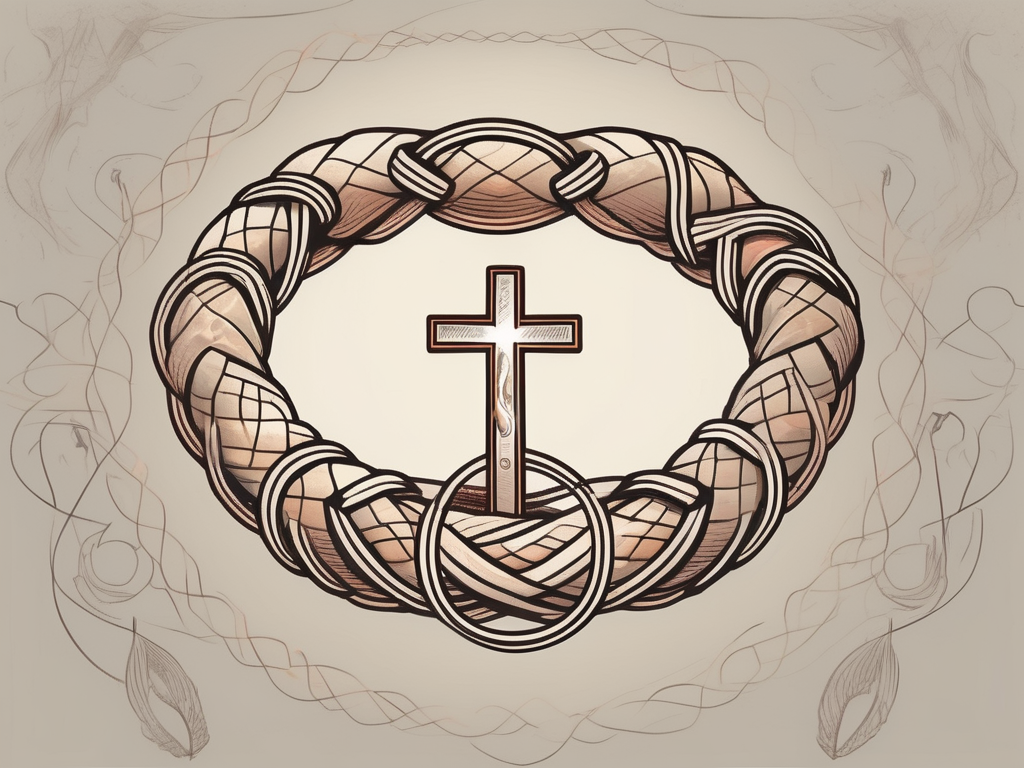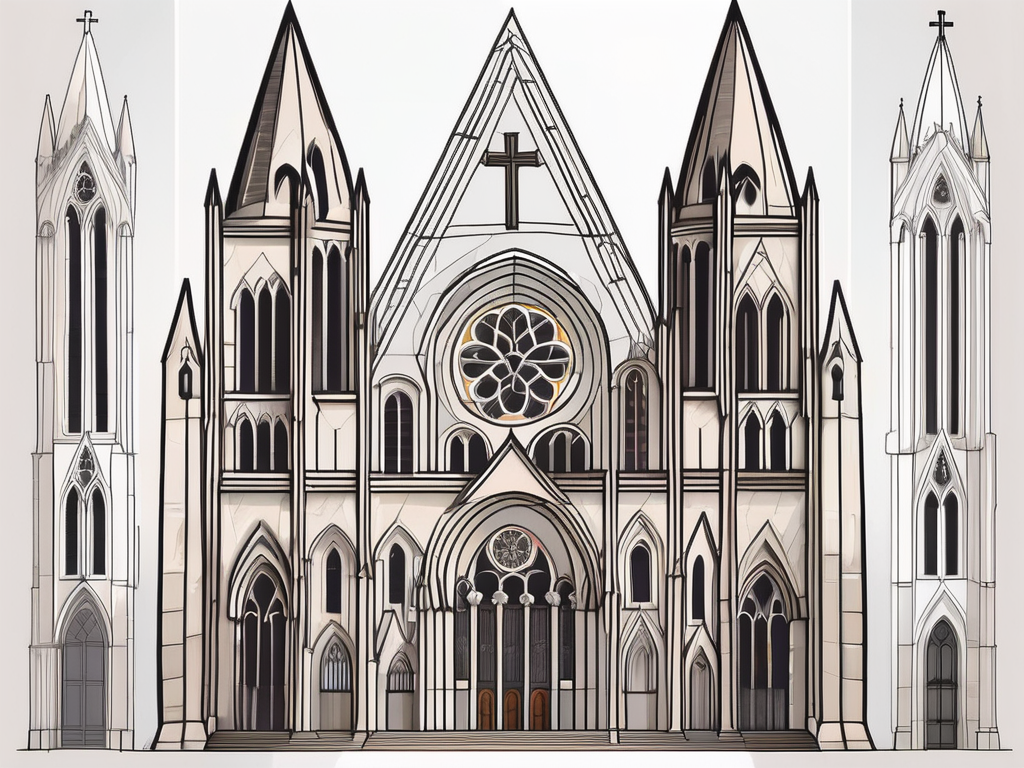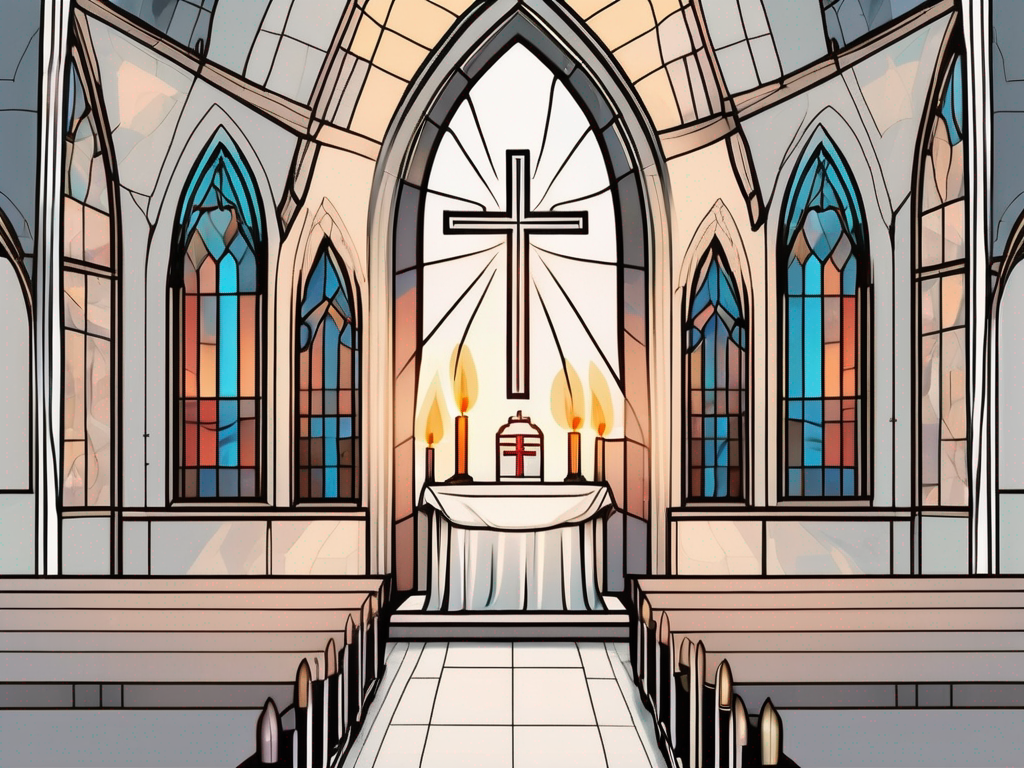Salvation is a central concept in Catholicism, encompassing the belief that humanity can be saved from sin and its consequences. Understanding the Catholic perspective on salvation involves exploring the interplay between faith, works, sacraments, purgatory, grace, and the role of the church and community. Let’s delve into these topics to get a comprehensive understanding of what Catholics believe about salvation.
Understanding the Concept of Salvation in Catholicism
Salvation, in Catholic theology, goes beyond a simple acknowledgment of faith. It involves a transformative journey that encompasses both faith and works. Catholics believe that through the redeeming sacrifice of Jesus Christ, humanity can be reconciled with God and receive eternal life.
At the core of Catholic understanding of salvation is the belief that Jesus Christ, the Son of God, came to earth to save humanity from sin and its consequences. Through his life, death, and resurrection, Jesus demonstrated God’s love and mercy, offering a path to salvation for all who believe in him.
The Role of Faith and Works in Salvation
Catholic doctrine emphasizes the inseparable connection between faith and works. While faith is the foundation of salvation, it must be accompanied by good works motivated by love. Catholics believe that faith without works is insufficient and that true believers will naturally strive to do good deeds in response to their faith.
This understanding echoes the words of St. James, who wrote in the New Testament, “Faith by itself, if it is not accompanied by action, is dead” (James 2:17). Therefore, Catholics emphasize the importance of both faith and works in the salvation process.
Good works, in Catholicism, are not seen as a means to earn salvation but rather as a response to God’s grace. They are an expression of love and gratitude towards God and a way to participate in His redemptive work in the world. Catholics are encouraged to perform acts of charity, seek justice, and care for the marginalized and vulnerable, as these actions reflect the teachings of Jesus and contribute to the building of God’s kingdom on earth.
The Sacraments and Their Connection to Salvation
Sacraments play a vital role in Catholicism, as they are seen as outward signs of inward grace. The sacraments, including baptism, confirmation, Eucharist, reconciliation, anointing of the sick, holy orders, and matrimony, are considered necessary for salvation. By participating in the sacraments, Catholics believe they are receiving God’s grace, which strengthens their relationship with Him and helps them on their journey towards salvation.
Baptism, the first sacrament, is seen as the gateway to salvation. Through baptism, individuals are cleansed of original sin and become members of the Church, the body of Christ. Confirmation, which follows baptism, is the sacrament in which the Holy Spirit is bestowed upon the individual, empowering them to live out their faith and witness to Christ in the world.
The Eucharist, also known as Holy Communion, is considered the source and summit of the Catholic faith. In the Eucharist, Catholics believe that the bread and wine become the body and blood of Christ, and by receiving it, they are united with Christ and nourished spiritually. The Eucharist is seen as a foretaste of the heavenly banquet and a means of receiving God’s grace for salvation.
Reconciliation, or the sacrament of Penance, is the sacrament through which Catholics seek forgiveness for their sins. By confessing their sins to a priest and receiving absolution, Catholics believe they are reconciled with God and restored to a state of grace.
The remaining sacraments, including anointing of the sick, holy orders, and matrimony, are also seen as channels of God’s grace and play a role in the salvation journey of individuals.
Overall, the concept of salvation in Catholicism encompasses a rich tapestry of faith, works, and sacraments. It is a journey of transformation and reconciliation with God, guided by the teachings of Jesus Christ and the sacramental life of the Church.
The Catholic Doctrine of Purgatory
In Catholic belief, purgatory is an intermediate state after death where souls undergo purification before entering into heaven. While purgatory is not explicitly mentioned in the Bible, Catholics believe in its existence based on the belief in God’s justice and mercy.
Purgatory is a concept that has been debated and discussed within the Catholic Church for centuries. It is seen as a necessary part of the salvation process, allowing for the final purification of souls before they can fully enter into the presence of God. This belief is rooted in the understanding that God is both just and merciful, and that He desires all souls to be cleansed of any remaining sins or imperfections before entering into eternal union with Him.
Purgatory’s Place in the Salvation Process
Catholics believe that purgatory is a necessary part of the salvation process. It is a place where souls are cleansed of any remaining sins or imperfections before entering into the presence of God. Purgatory allows for a final purification and a completion of the transformation process that leads to eternal union with God.
Within the Catholic understanding, salvation is seen as a journey that begins with baptism, where original sin is washed away and the individual is initiated into the life of grace. However, even after baptism, individuals may still commit sins and fall short of the perfection required to enter into heaven. Purgatory is seen as the means by which these sins are purged and the soul is made ready for the fullness of divine communion.
It is important to note that purgatory is not seen as a second chance at salvation, but rather as a continuation of the process of sanctification. The souls in purgatory are already saved, but they require further purification in order to be fully prepared for the beatific vision of God.
Common Misconceptions About Purgatory
Purgatory is often misunderstood and mistakenly equated with a second chance at salvation or as a temporary hell. However, Catholic teaching asserts that purgatory is not a place of condemnation or eternal punishment. It is rather a state of temporary suffering and purification, where souls are ultimately destined for heaven.
One common misconception is that purgatory is a place of torment or suffering similar to hell. This is not the case. While the souls in purgatory do experience a certain degree of suffering, it is not the same as the eternal punishment of hell. The suffering in purgatory is seen as a purifying fire that burns away the remnants of sin and imperfection, allowing the soul to be fully prepared for the joys of heaven.
Another misconception is that purgatory is a place where individuals have a second chance at salvation. This is not the Catholic understanding. Purgatory is not a place of conversion or repentance, but rather a place of final purification for those who have already been saved. It is a state in which the soul undergoes a process of purification, with the assurance that it will eventually enter into the fullness of divine communion.
In conclusion, the Catholic doctrine of purgatory is a belief in an intermediate state after death where souls undergo purification before entering into heaven. It is a necessary part of the salvation process, allowing for the final purification and transformation of souls before they can fully enter into the presence of God. Purgatory is often misunderstood, but it is not a second chance at salvation or a place of eternal punishment. It is a state of temporary suffering and purification, where souls are ultimately destined for eternal union with God.
Grace and Salvation in Catholic Belief
Grace, in Catholic theology, is understood as God’s undeserved gift freely given to humanity. It is through God’s grace that salvation is made possible.
In Catholic belief, grace is a central concept that plays a vital role in the journey towards salvation. It is not something that can be earned or merited by human effort, but rather it is bestowed upon individuals by God Himself. This understanding of grace emphasizes the unmerited favor and love that God has for His creation.
Within Catholic theology, grace is seen as a transformative force that works within individuals to bring about a change of heart and a deepening of their relationship with God. It is through the reception of God’s grace that believers are enabled to resist sin and grow closer to Him.
The Concept of Grace in Catholic Theology
Catholics believe that God’s grace is instrumental in the process of salvation. It is not earned or merited but bestowed upon individuals through the sacraments, prayer, and acts of charity. Grace is seen as strengthening believers, enabling them to resist sin and grow closer to God.
When Catholics speak of grace, they often refer to it as a supernatural gift from God that empowers individuals to live a life of holiness and righteousness. This understanding of grace aligns with the belief that humans are incapable of achieving salvation on their own and are in need of divine intervention.
Furthermore, Catholics believe that grace is not limited to a one-time event but is an ongoing and continuous presence in the life of a believer. It is through the reception of God’s grace that individuals are able to continually grow in their faith and deepen their relationship with Him.
How Grace Influences the Path to Salvation
Grace is considered to be transformative, working within individuals to conform them to the image of Christ. By cooperating with God’s grace through faith and good works, Catholics believe they can participate actively in their own salvation journey. Grace empowers them to persevere in their faith and to live a life that reflects God’s love and mercy.
The Catholic Church teaches that salvation is not solely dependent on human effort but is a result of God’s grace working in conjunction with an individual’s response of faith and obedience. It is through the reception of God’s grace that believers are enabled to live a life that is pleasing to Him.
Additionally, Catholics believe that grace is not limited to the individual but is also present within the Church as a whole. It is through the sacraments, which are considered channels of God’s grace, that believers are able to receive the divine assistance needed for their salvation.
In conclusion, grace is a fundamental concept in Catholic belief, playing a crucial role in the journey towards salvation. It is through the unmerited favor and love of God that individuals are empowered to resist sin, grow closer to Him, and actively participate in their own salvation journey. Grace is seen as a transformative force that enables believers to conform to the image of Christ and live a life that reflects God’s love and mercy.
The Role of the Church and Community in Salvation
Catholic teaching emphasizes the importance of the church and community in the salvation of individuals.
The Church’s Teaching on Collective Salvation
The Catholic Church teaches that salvation, while personal, is also communal. It highlights the interconnectedness of all believers and the responsibility to support and encourage one another in the journey towards eternal life. Through the church, guided by the teachings of Jesus Christ and the Holy Spirit, Catholics find guidance, support, and the sacraments necessary for salvation.
The Importance of Community in Achieving Salvation
Catholics believe that the faith is not meant to be lived in isolation. The community, which includes fellow believers and the communion of saints, offers companionship, accountability, and opportunities for growth. Through community engagement, Catholics can experience love, share their faith, and carry each other’s burdens, ultimately fostering a stronger collective commitment to salvation.
The Catholic Perspective on Heaven and Hell
Heaven and hell play a significant role in the Catholic understanding of salvation.
The Catholic Vision of Heaven
Heaven, in Catholic belief, is the ultimate destination of the faithful. It is the eternal and blissful state of perfect union with God, where believers experience everlasting joy, peace, and fulfillment.
The Catholic Understanding of Hell and Damnation
Catholics acknowledge the reality of hell as a place of separation from God. Hell is seen as the consequence of a willful rejection of God’s love and refusal to repent. While the church teaches about the reality of hell, it also upholds the hope of salvation through God’s infinite mercy and the potential for redemption through sincere repentance.
In conclusion, understanding what Catholics believe about salvation involves exploring various interconnected facets, including the significance of faith and works, the role of sacraments, the notion of purgatory, the influence of grace, the importance of the church and community, and the understanding of heaven and hell. It is through these beliefs that Catholics seek to navigate their journey towards eternal life with God.

